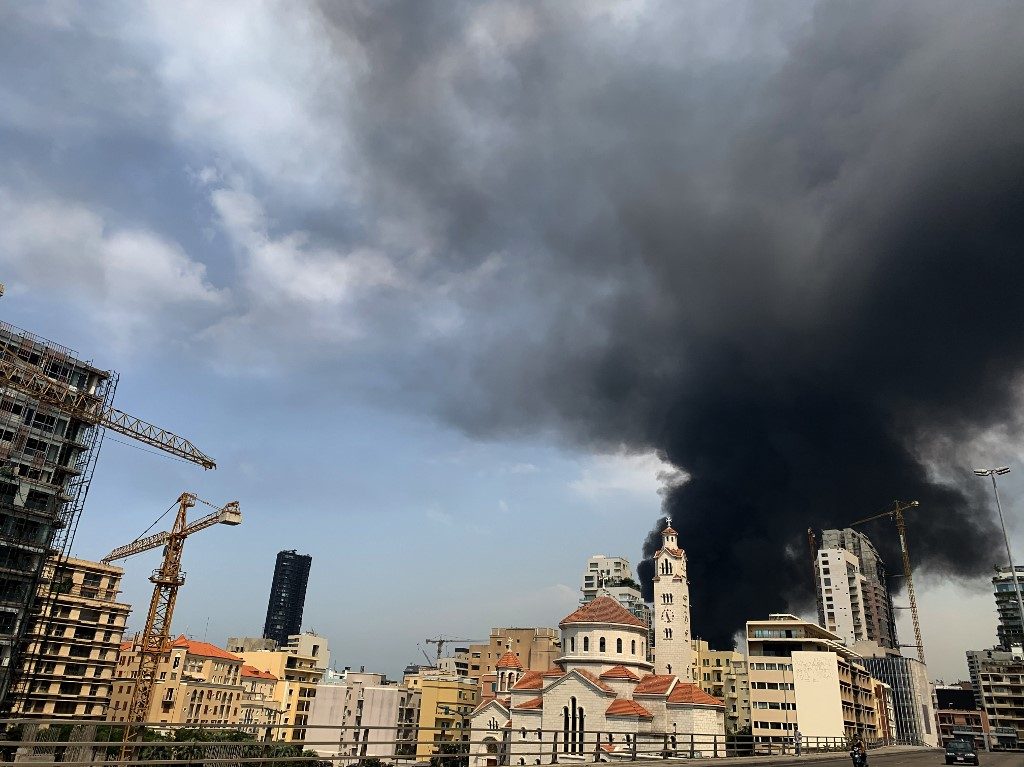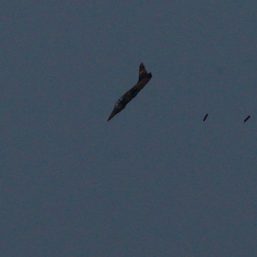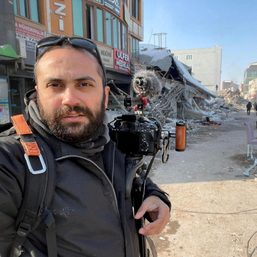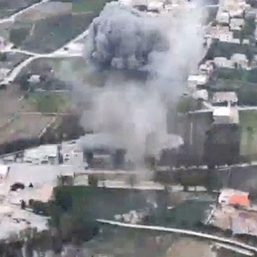SUMMARY
This is AI generated summarization, which may have errors. For context, always refer to the full article.

A huge fire raged in Beirut’s port Thursday, September 10, sending a column of black smoke billowing into the sky and sparking alarm among Lebanese still reeling from the devastating dockside blast last month.
It was not immediately clear what caused the blaze just over a month after the August 4 blast which killed more than 190 people, wounded thousands and ravaged much of the capital.
Clouds of dark smoke spilled into the sky above the capital, and were visible from its suburbs, after the army said the fire broke out in a warehouse containing oil and tires.
Firefighters and army helicopters continued to battle the blaze several hours after it broke out, an Agence France-Presse (AFP) photographer said, after security forces cleared surrounding roads.
Haitham, a 33-year-old worker at a company at the port, told AFP how he fled the fire as fast as he could.
“We were working when all of a sudden they started yelling at us to get out,” he said. “There was welding going on… and a fire broke out. We don’t know what happened.
“We dropped everything and started running…. It reminded us of the explosion.”
Interim port chief Bassem al-Kaissi told local the LBC television channel that the blaze started in the free zone, where an importer had stocked cooking oil containers and tires.
The fire “started with oil containers before moving on to the tires,” he said. “It was either caused by the heat or by a mistake. It’s too early to say.”
‘Can’t take this much trauma’
Civil Defense chief Raymond Khattar said putting out the fire was taking longer because it was rubber and oil burning.
“Flammable materials like this take time to be completely extinguished,” he said.
The Lebanese Red Cross said one person was being treated after inhaling smoke.
A judicial source told AFP the public prosecutor had tasked “all security agencies to conduct the necessary investigations and determine the type of materials burnt and the causes of the fire breaking out.”
President Michel Aoun summoned a meeting of the Supreme Defense Council to discuss to fire, his office said.
Social media users posted video footage of the blaze, which unsettled Beirut residents only just recovering from the country’s deadliest peacetime disaster.
“Insane fire at the port, causing a panic all across Beirut. We just can’t catch a break,” Human Rights Watch researcher Aya Majzoub wrote on Twitter.
“We can’t take this much trauma,” another user wrote.
The August 4 blast sparked widespread outrage after it emerged authorities had been aware for years of the presence of the huge stockpile of ammonium nitrate that blew up.
The scandal forced the government to resign.
‘Crime scene’
Thursday’s blaze comes just two days after another smaller fire at the port, which the army said took hold of a mix of rubbish, wood and old tires.
Criminology researcher Omar Nashabe tweeted about the latest disaster: “Where are we living?”
“This is the scene of the crime a month ago! Where is the judiciary? Where is the state? Where is responsibility?”
The August 4 blast had heaped new misery on Lebanese already battling the coronavirus pandemic and the country’s worst economic crisis in decades, which has seen poverty rates double to more than half the population.
Lebanon has launched a probe into the blast, one off the biggest non-nuclear explosions ever, and arrested 25 suspects so far.
Among them are top port and customs officials, as well as Syrian workers who allegedly carried out welding hours before the explosion.
On Thursday, the lead investigating judge listened to the testimonies of caretaker transport and public works minister Michel Najjar and State Security agency head Tony Saliba, the National News Agency said.
Lebanon has rejected an international investigation into the explosion, but its probe is being aided by foreign experts, including from the American FBI and France. – Rappler.com
Add a comment
How does this make you feel?





There are no comments yet. Add your comment to start the conversation.